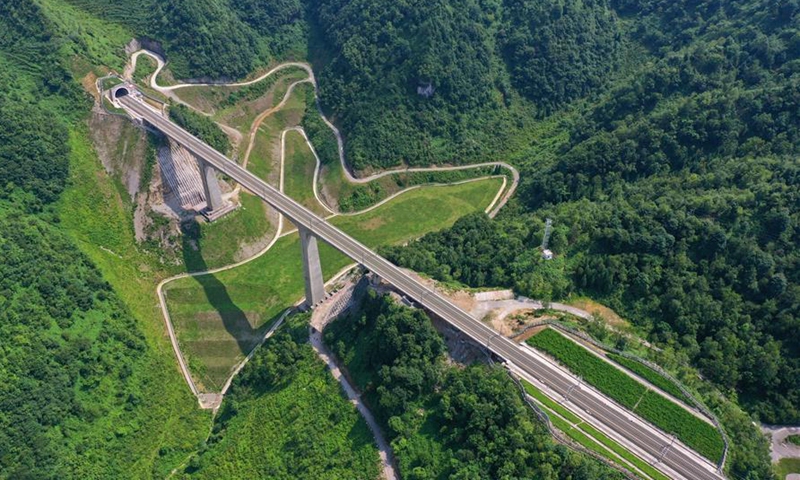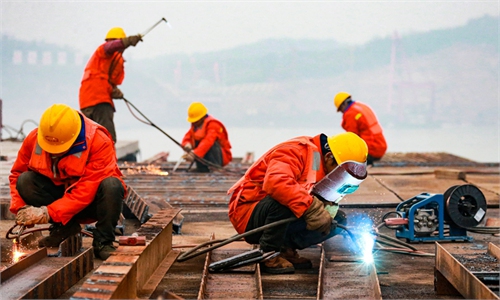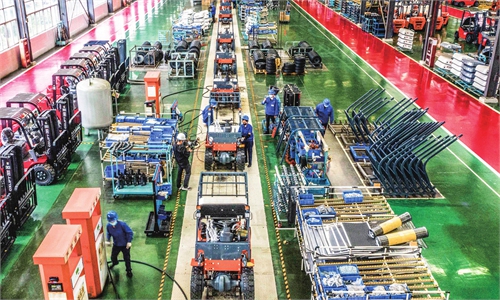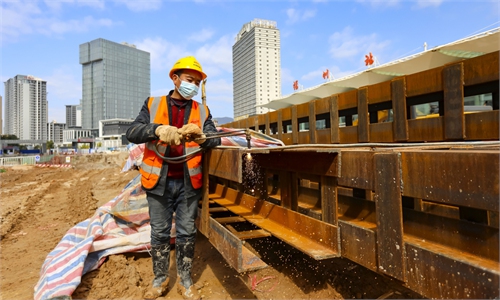Top meeting stresses strengthening China's infrastructure construction to lead industrial development and safeguard national security

Aerial photo taken on July 6, 2020 shows a railway bridge along the Anshun-Liupanshui railway in Southwest China's Guizhou Province. Photo: Xinhua
A top meeting on Tuesday stressed efforts to strengthen the construction of China's infrastructure to lead industrial development and safeguard national security.
The 11th meeting of the Central Committee for Financial and Economic Affairs held on Tuesday pointed out that strengthening infrastructure construction in an all-round way is of great significance to ensure national security, expand domestic demand, foster the dual circulation strategy and promote the high-quality development of the country.
Since the 18th CPC National Congress of the Communist Party of China (CPC), China has made world leading accomplishments in major scientific and technological facilities, water conservancy projects, transportation hubs, information infrastructure and national strategic reserves. However, it must be recognized that China's infrastructure still does not match the standards needed to ensure national development and security, the meeting said.
Efforts should be made to appropriately advance the layout of infrastructure that is conducive to industrial development and safeguarding national security with scientific planning, coordinated work from the central and regional levels and a balance on economic efficiency and quality, the meeting said.
Analysts said that it is of great significance to step up infrastructure efforts at this stage to shore up the economy amid COVID-19 flare-ups in many cities across the country.
Infrastructure investment is expected to be a major engine for economic stimulation, dragging up domestic demand and stabilizing employment, Yang Chang, economist at Zhongtai Securities, told the Global Times on Tuesday.
As a bright spot in China's economic data in Q1, infrastructure investment gained 8.5 percent growth in the first quarter on a yearly basis, up from the 8.1 percent in the first two months.
It is estimated that the manufacturing and construction industries are the main sources of employment in urban areas, with more than 40 million people working in manufacture and over 20 million in construction. These two industries also accommodated more than 45 percent of China's total migrant workers.
"Therefore, at the present stage, giving full play to the role of infrastructure investment and strengthening infrastructure construction to build a modern infrastructure system, is crucial to stabilize China's economic foundations," Yang said.
China's investment in road and waterway infrastructure rose in the first quarter of the year according to data from the Ministry of Transport.
Fixed-asset investment in road and waterway infrastructure jumped 11.4 percent year-on-year to 512 billion yuan ($78.88 billion) during the period, according to the ministry.
Northwest China's Ningxia Hui Autonomous Region reported the fastest growth in this regard, with investment surging 135 percent from the previous year.
Northeast China's Liaoning Province saw the sharpest decline during the January-March period, with investment plunging 95.8 percent year-on-year, the data show.
Analysts pointed out that there is still broad space for China's infrastructure construction.
In addition to infrastructure projects, such as water conservancy and roads, investment in infrastructure related to people's livelihood, such as health care, education and social security, is still in obvious demand, Yang noted.



